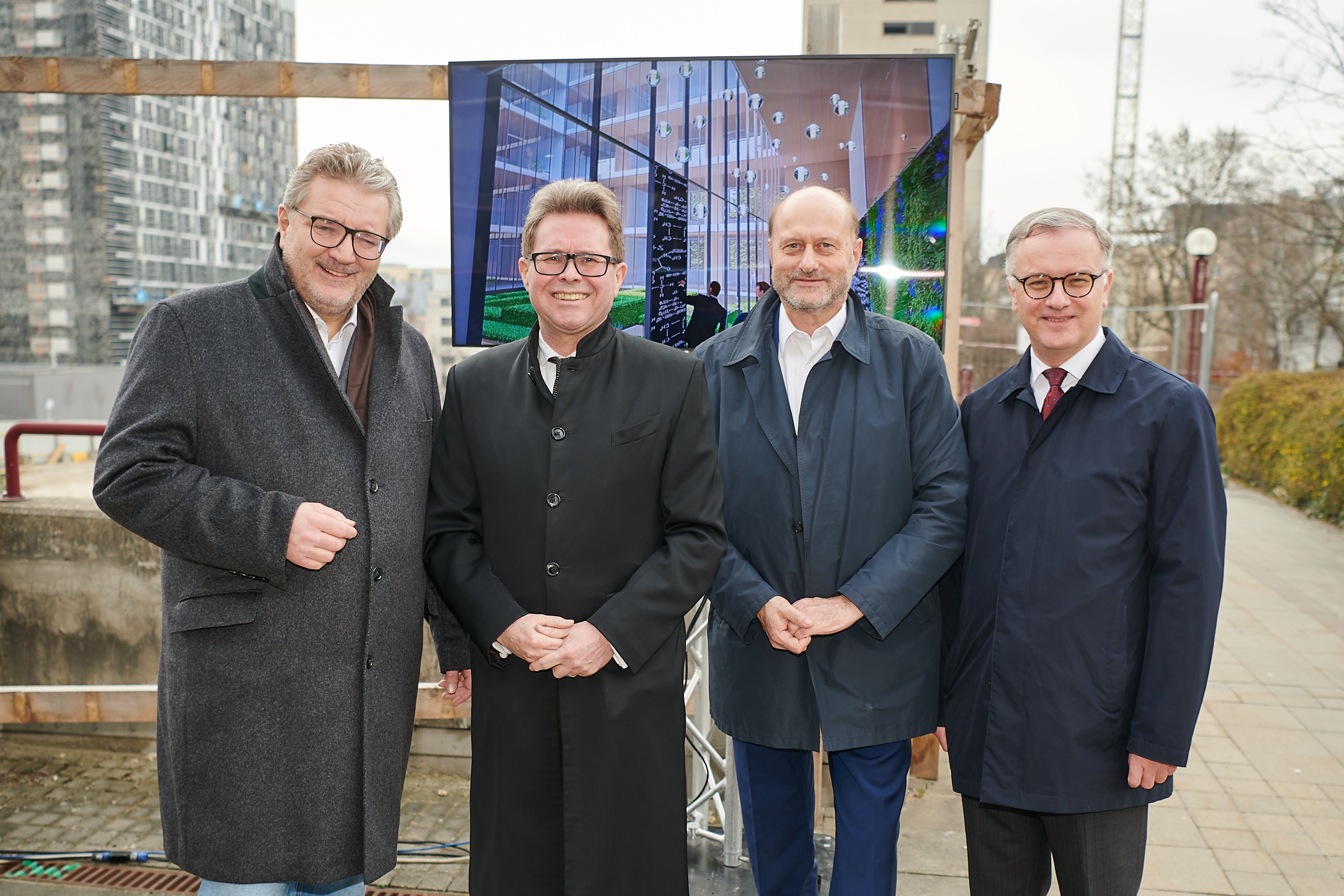
Vienna, 13-03-2023) The project presentation for the Centre for Translational Medicine took place today as part of the "Day of the Medical University of Vienna" in the presence of Science Minister Martin Polaschek, Vienna's City Councillor for Health Peter Hacker, MedUni Vienna Rector Markus Müller and the Director of the University Hospital Vienna Herwig Wetzlinger. At the MedUni Campus University Hospital Vienna in Vienna's 9th district, the federal government and the City of Vienna will jointly create the structural conditions for bridging the gap between basic research and clinical application on an area of more than 14,000 m² by 2025. The new centre follows the principle of translational medicine ("from the laboratory to the bedside and back to the laboratory") and is designed to make new scientific findings available to patients as quickly as possible.
Minister of Education, Science and Research Martin Polaschek: "Science and research positively influence our lives every day. What starts in research sooner or later ends up with us – be it at home, at school or at the bedside. The Centre for Translational Medicine at the Medical University of Vienna spans this arc from the findings of science and their verification through research to their application in our lives. At the MedUni Campus University Hospital Vienna, we are now jointly creating the structural prerequisites to connect basic research and clinical application with each other, also in terms of space. The results will enable modern and targeted treatment methods for patients and thus provide the basis for future healthcare in Austria.
Peter Hacker, City Councillor for Social Affairs, Health and Sport of the City of Vienna: "From the laboratory to the bedside and back to the laboratory - where better to realise this leitmotif of translational medicine than on the grounds of the University Hospital Vienna, Austria's largest hospital with its special position within the healthcare system in Vienna as well as in Austria as a whole. It was therefore obvious to locate this place of exchange between basic research and applied medicine here. Bringing research results to patients as quickly as possible in the form of new or improved diagnosis and therapy options is an essential part of the health policy of the City of Vienna. The Centre for Translational Medicine in cooperation with the Federal Government, the City of Vienna, the Medical University of Vienna and the University Hospital Vienna not only consolidates Vienna as a centre of science but, above all, benefits patients far beyond the sphere of influence of the University Hospital Vienna".
"The laying of the foundation stone for the MedUni Campus Mariannengasse and the start of construction of the Eric Kandel Institute - Centre for Precision Medicine were followed today by the presentation of another of MedUni Vienna's major projects for this year," Markus Müller, Rector of the Medical University Vienna, emphasised. "The Centre for Translational Medicine is the structural implementation of the principle 'from bench to bedside and back again', which is already successfully implemented by MedUni Vienna in many areas. In order to ensure that research findings can be applied even faster to patient care in the future, the new infrastructure will create optimal conditions for translating science into implementation. The new centre is another important contribution to strengthening Vienna as a centre of innovation and for the further development of high-quality healthcare for the population.
"The expansion of the research areas is an important part of the framework construction agreement concluded between the federal government and the City of Vienna, which enables the modernisation of the joint location of the University Hospital Vienna and MedUni Vienna. The immediate proximity of the new research centre to patient care at the University Hospital Vienna promotes the core of translational medicine 'from bench to bedside and back' and makes it possible for basic research to reach patients as quickly as possible and, conversely, for experience and knowledge from the clinic to flow back to the centre, into the research and development of diagnostics and therapies. This project guarantees that patient care at the University Hospital Vienna will continue to be of the highest possible quality," says Herwig Wetzlinger, Director of the University Hospital Vienna.
About the Centre for Translational Medicine
The new centre follows the concept of translational medicine "from bench to bedside and back again". On one hand, this means that new findings from basic research are applied as quickly as possible in the diagnosis and therapy of diseases. On the other hand, the researchers take into account the experience and knowledge gained from patient care at the University Hospital Vienna in their scientific investigations. In order for this to succeed under optimal conditions, the building is designed as a place of exchange.
Above all, however, the researchers will find modern infrastructure for their research work on approximately 14,000 m2 of floor space. In addition to laboratory space, there will not only be a GMP facility for cell therapy, radio-pharmacy and biologicals, core facilities, an animal facility with preclinical imaging and a biobank, but also a clinical centre for phase I and II studies including a probationary station.
The strategic, translational orientation of the new building as a hub between laboratory, clinic and teaching is underlined by its location: The Centre for Translational Medicine will be built on the axis between the University Hospital Vienna and the MedUni Campus Mariannengasse, another of MedUni Vienna's current construction projects, where previously scattered preclinical facilities will be brought together, creating a modern learning environment for students. The architectural link with the Eric Kandel Institute - Centre for Precision Medicine, the construction of which began just a few weeks ago, illustrates another goal of the Centre for Translational Medicine: to further advance the possibilities of customised, personalised medicine.
The Centre for Translational Medicine is scheduled for completion by 2025. The total investment of around 120 million euros is being funded by the federal government and the City of Vienna.